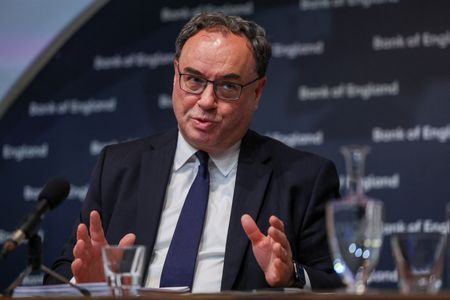 1
1 1
1
LONDON (Reuters) -Bank of England Governor Andrew Bailey said on Wednesday there were some signs of a cooling of inflation pressure in Britain’s labour market but it was too soon to say the risks posed by the shortage of workers was over.
“There are signs that the labour market is loosening a little,” Bailey said in a speech to the British Chambers of Commerce, citing an increase in the numbers of people seeking work and a drop in vacancies in data published on Tuesday.
He said there were signs that pay growth could ease further later this year.
“But the easing of labour market tightness is happening at a slower pace than we expected in February, and the labour market remains very tight,” Bailey said.
The BoE last week raised interest rates for the 12th time in a row, taking Bank Rate to 4.5%, and investors on Wednesday were pricing a roughly two-in-three chance of a further 25 basis-point increase at the central bank’s June meeting.
However, some of the bets on further BoE rate hikes this year were pared back after Tuesday’s data suggested some of the inflationary heat was coming out of the labour market.
The BoE has said it will watch the economic data closely before announcing its next decision on June 22. Official data releases due between now and then include two sets of inflation figures and another round of labour market data.
Bailey said on Wednesday that even if headline inflation falls quickly this year, as expected, second-round effects – which are typically demands for higher wages – were “unlikely to go away as quickly as they appeared.”
He also said “things are looking a bit brighter than they did a couple of months ago” for Britain’s economy, reiterating the message of the BoE’s latest forecasts published last week which no longer saw the possibility of a recession.
(Reporting by David MillikenWriting by William Schomberg; editing by William James)